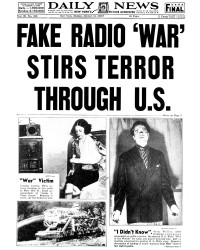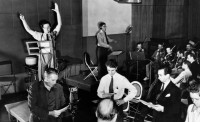 Seventy-seven years ago, Orson Welles’ Mercury Theater broadcast a radio play of H.G. Wells’ alien invasion classic The War of the Worlds. The next day was Halloween and the newspapers dutifully scaremongered, splashing sensationalized headlines on their front pages about the mass hysteria the radio program had provoked in the listening audience. There were reports of suicides, people being hospitalized for shock, heart attacks and thousands of terrified callers clogging the radio station’s phone lines. Almost all of those reports have proven unfounded, although it is true that more people than usual called the station, some complaining about the show being too scary, others complimenting the show for being so scary, still others wanting to know how they could help the victims of Martian violence.
Seventy-seven years ago, Orson Welles’ Mercury Theater broadcast a radio play of H.G. Wells’ alien invasion classic The War of the Worlds. The next day was Halloween and the newspapers dutifully scaremongered, splashing sensationalized headlines on their front pages about the mass hysteria the radio program had provoked in the listening audience. There were reports of suicides, people being hospitalized for shock, heart attacks and thousands of terrified callers clogging the radio station’s phone lines. Almost all of those reports have proven unfounded, although it is true that more people than usual called the station, some complaining about the show being too scary, others complimenting the show for being so scary, still others wanting to know how they could help the victims of Martian violence.
One of the frightened listeners sued CBS for “nervous shock”, but the suit was dismissed. One man wrote to CBS claiming he had spent $3.25 of his savings for a bus ticket to flee the Martians and only heard it was play 60 miles later. He was saving up to buy a new pair of shoes, so he asked CBS to send him a pair of black men’s shoes, size 9-B. Welles sent him his new shoes, against the advice of CBS’ lawyer.
Orson Welles had already had success on radio in 1937 as the voice of The Shadow and on the stage with his innovative Mercury Theater company when CBS offered him a one-hour anthology series debuting in July 1938. This was prestige listening, adaptations of the great works of literature written and performed by a professional troupe of the New York theater. The introduction emphasized this pedigree, noting it was radio’s “first presentation of a complete theatrical producing company.” Welles and his Mercury Theater cast and crew put on the works of William Shakespeare (Julius Caesar), Alexandre Dumas (The Count of Monte Cristo), Charles Dickens (Pickwick Papers) and Robert Louis Stevenson (Treasure Island), among many others.
 It is true that Welles deliberately set out to give his version of The War of the Worlds a realistic news story staging complete with expert commentary, witness interviews and fake reports from military honchos. It wasn’t a hoax, though; just a way of giving the show a fresh, dynamic immediacy and give the audience a nice little scare for Halloween. Still, CBS was concerned that people might confuse it with real news, so they made sure there were disclaimers not just before the opening of the program, but also at the 40 and 55 minute marks.
It is true that Welles deliberately set out to give his version of The War of the Worlds a realistic news story staging complete with expert commentary, witness interviews and fake reports from military honchos. It wasn’t a hoax, though; just a way of giving the show a fresh, dynamic immediacy and give the audience a nice little scare for Halloween. Still, CBS was concerned that people might confuse it with real news, so they made sure there were disclaimers not just before the opening of the program, but also at the 40 and 55 minute marks.
The show opened with what sounded like standard radio programming — a weather report followed by an orchestra playing music in a hotel ballroom — that was suddenly interrupted by a special new bulletin reporting explosions of hydrogen gas on Mars. Then it was back to the sleepy dance music, then another special bulletin, then back to the orchestra, then another break away to an astronomer describing what he saw on Mars. The tension grew from there as reports got more and more dramatic and the regular programming of music kept getting cut off after a few bars.
The other Mercury Theater broadcasts were more traditional radio plays. Welles’ twist for The War of the Worlds was to use radio conventions to convey the confusion and terror of the original story. He had the cast listen to WLS radio reporter Herbert Morrison’s real-time description of the Hindenburg disaster, still famous today for its “Oh the humanity!” anguish, to get that genuine feeling of a newsman’s increasing horror as tragedy unfolds before him. Cast member Frank Readick played that role to perfection.
The Halloween headlines condemned Orson Welles as a hoaxster and instigator of widespread panic. It was enough to scare CBS into calling a hasty press conference at which Welles expressed his deep regret, insisting he had no idea anybody would take it seriously.
[youtube=https://youtu.be/uuEGiruAFSw&w=430]
He may or may not have been genuinely contrite (his expression around the 5:35 mark reminds me of Puss in Boots’ big-eyed hat-in-hand look from Shrek), but the story vaulted him to national fame, secured a sponsor (Campbell’s Soup) and another two years of the radio show. It’s also the reason RKO Studios gave Orson Welles an unprecedented two-movie contract granting him complete artistic control of his pictures. Without The War of the Worlds, there would have been no Citizen Kane.
The broadcast still holds up, even though reporters don’t talk like that anymore. The sound effects — especially the panicked crowd noises — are great and the adaptation remains one of exceptional dexterity and verve. Listen for yourself and see what you think. Would have spent all your shoe money on a ticket out of town if you had heard this 77 years ago?